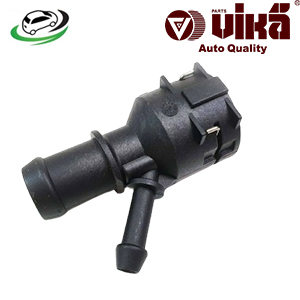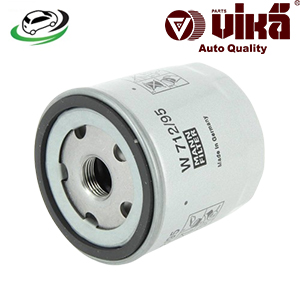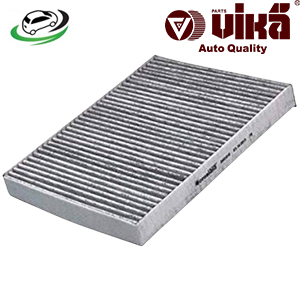-12%
Get Cabin Filter (Air-Con) Charcoal Filter Audi Q7/VW Amarok 2010/Touareg 2003-2010/T5/T6 2004- 7H0819631
Cabin air filters, specifically charcoal filters, play a vital role in maintaining the air quality inside a vehicle. These filters are designed to remove pollutants, allergens, and odors from the air that enters the cabin through the HVAC (Heating, Ventilation, and Air Conditioning) system. Understanding the function, benefits, types, maintenance, and common issues associated with cabin air filters, particularly charcoal filters, is essential for vehicle owners who prioritize comfort and health.
Function of Cabin Air Filters
- Air Purification: Cabin air filters trap dust, pollen, mold spores, and other airborne contaminants, ensuring that the air inside the vehicle is clean and safe to breathe.
- Odor Removal: Charcoal filters are particularly effective at absorbing and neutralizing odors from outside the vehicle, such as exhaust fumes, industrial smells, and other unpleasant scents.
- Allergen Reduction: By filtering out allergens like pollen and mold spores, cabin air filters help reduce allergic reactions and respiratory issues for occupants.
- Protecting HVAC System: These filters prevent dust and debris from clogging the HVAC system, which can lead to reduced efficiency and potential damage.
Benefits of Charcoal Cabin Air Filters
- Enhanced Filtration: Charcoal, or activated carbon, filters offer superior filtration compared to standard particulate filters. They can trap smaller particles and absorb gases and odors.
- Improved Air Quality: By removing a wider range of contaminants, charcoal filters significantly improve the air quality inside the vehicle, making it more comfortable for passengers.
- Odor Control: The activated carbon in these filters is highly effective at neutralizing odors, providing a fresher and more pleasant cabin environment.
- Health Benefits: For individuals with allergies, asthma, or other respiratory conditions, charcoal filters can help minimize symptoms by reducing exposure to airborne irritants.
Types of Cabin Air Filters
- Particulate Filters: These filters are designed to capture solid particles such as dust, pollen, and mold spores. They are effective for basic filtration needs but do not absorb odors or gases.
- Charcoal (Activated Carbon) Filters: In addition to capturing solid particles, these filters contain activated carbon, which absorbs odors and gases. They provide a higher level of filtration and are ideal for improving overall air quality.
- Electrostatic Filters: These filters use an electrostatic charge to attract and capture particles. They are often combined with particulate or charcoal filters for enhanced filtration efficiency.
Signs of a Dirty or Failing Cabin Air Filter
- Reduced Airflow: If the airflow from the vents is weak, it could indicate a clogged cabin air filter.
- Unpleasant Odors: Persistent bad smells inside the vehicle, even when the air conditioning or heating is running, can be a sign of a dirty or failing charcoal filter.
- Increased Allergic Reactions: If passengers are experiencing more frequent allergy symptoms, it could be due to an ineffective cabin air filter that is no longer trapping allergens effectively.
- Foggy Windows: Excess moisture in the cabin can cause windows to fog up more easily. A dirty cabin air filter can contribute to this issue by restricting airflow and ventilation.
Maintenance and Replacement
Regular maintenance and timely replacement of cabin air filters are crucial for maintaining optimal air quality and HVAC system performance. Here are the steps to follow:
- Inspection: Check the cabin air filter every 12,000 to 15,000 miles or as recommended by the vehicle manufacturer. In areas with high pollution or pollen levels, more frequent inspections may be necessary.
- Replacement: Replace the cabin air filter at the first sign of reduced airflow, unpleasant odors, or according to the vehicle’s maintenance schedule. Charcoal filters may need more frequent replacement due to their odor-absorbing properties.
- DIY Replacement: Many cabin air filters can be easily replaced by the vehicle owner. Consult the vehicle’s manual for the location and replacement procedure. Typically, the filter is located behind the glove compartment or under the dashboard.
- Professional Service: If unsure about the condition of the cabin air filter or how to replace it, consult a professional mechanic for an accurate assessment and service.
Replacement Procedure
- Locate the Filter: The cabin air filter is usually located behind the glove compartment, under the dashboard, or near the HVAC system. Consult the vehicle’s manual for the exact location.
- Remove the Cover: Depending on the location, you may need to remove screws or clips to access the filter compartment.
- Remove the Old Filter: Carefully take out the old filter and inspect it for dirt and debris. Note the direction of airflow indicated on the filter to ensure correct installation of the new one.
- Clean the Housing: Wipe out any dust or debris from the filter housing to ensure a clean environment for the new filter.
- Install the New Filter: Insert the new cabin air filter, ensuring it is oriented correctly according to the airflow direction indicated on the filter.
- Replace the Cover: Secure the cover back in place with screws or clips.
- Final Check: Turn on the HVAC system and check for proper airflow and any unusual smells to ensure the new filter is functioning correctly.
Common Issues and Troubleshooting
- Incorrect Filter Type: Using the wrong type or size of cabin air filter can lead to poor filtration and reduced HVAC performance. Always use the specified filter for your vehicle.
- Improper Installation: Ensure the cabin air filter is correctly installed with the proper airflow orientation to avoid reduced efficiency and potential damage to the HVAC system.
- Neglecting Maintenance: Failing to regularly inspect and replace the cabin air filter can lead to reduced air quality, increased allergic reactions, and potential HVAC system damage.
- Poor Quality Filters: Using low-quality or incompatible aftermarket filters can result in poor performance and reliability. Invest in high-quality filters from reputable manufacturers.
Follow us on Facebook for more parts.



